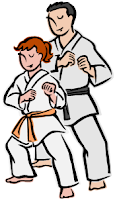Karate Customer Service
It surprises me to no end how many martial arts instructors want a full time dojo so badly but have struggled for years unable to grow their student count to more than 20 students. And then when they finally go full time they end up folding faster than poker legend Doyle Brunson holding a deuce, 7.
Most believe that it’s anything but themselves that determines their success. Often instructors look outwards for any excuse, when instead the answers are often staring them right in the face.
In my area 3 TKD schools have opened up and closed within 2 years. Yet at my dojo we have gone from strength to strength.
So what’s the difference?
I’ll give you a hint:
It’s not usually WHAT you teach, it’s HOW you teach it, and about HOW you make people FEEL about having YOU as their teacher.
(How many times have you heard people complain about their kid’s new school teacher? “Oh, Johnny’s got Ms. Lucifer this year, I’m really not happy about it!”)
 So how do you create a good feeling for your students and families?
So how do you create a good feeling for your students and families?
It all starts with having a positive attitude and providing great customer service.
And ends with the notion that:
Happy students continue to train. Unhappy students quit.
Furthermore if you teach mostly kids (as most martial arts schools do) this notion can be expanded to this rule:
Happy kid -> happy parent -> student stays enrolled.
Unhappy kid -> unhappy parent -> student quits.
So how do you keep students and families happy?
Here are 10 tips to providing better customer service for your dojo
- Greet people by their name (kids and parents).
- Treat each student like they’re your only student by giving them a warm welcome and take the time to LISTEN to what they want to tell you.
- Always answer customer service questions and concerns promptly and courteously. If you receive a phone call, return it same day, preferably within the hour. If you receive an email inquiry, set up an autoresponder to let them know you’ve received it and when they can expect a reply.
- Always remain calm, but firm, even when dealing with the most high maintenance students/families.
- Go the extra step! Do things that other schools don’t. Have special appreciation events for your students, social activities, send thank you cards, etc.
- Open the door for people. Thank people when they leave.
- Praise students. Yes, even the ones who struggle to do good technique or the ones who have a hard time behaving. Remember any improvement from the previous class is great!
- Smile! A lot! You’ll actually improve your mood by forcing yourself to smile. And it’ll rub off on those around you.
- Be outrageous! Do things that people remember and talk about. Remember NORMAL is BORING. Have fun in a big way.
- Cultivate a warm an inviting atmosphere, not a place where people are scared to go.
I hope each of these quick tips can inspire you to do more… for not only your student’s sake, but your dojo’s also!
